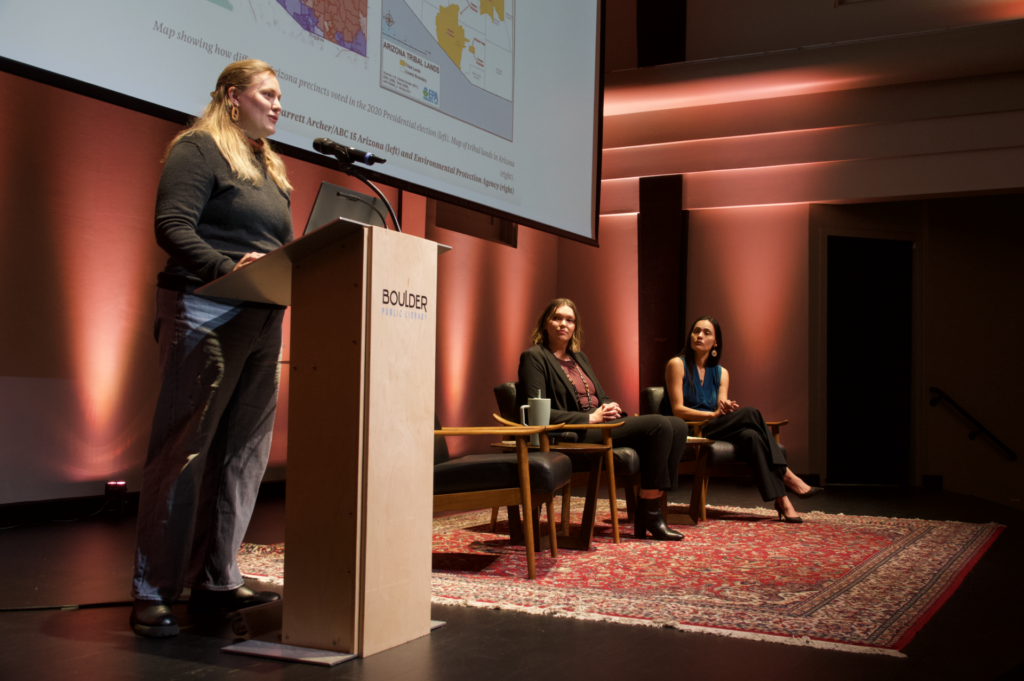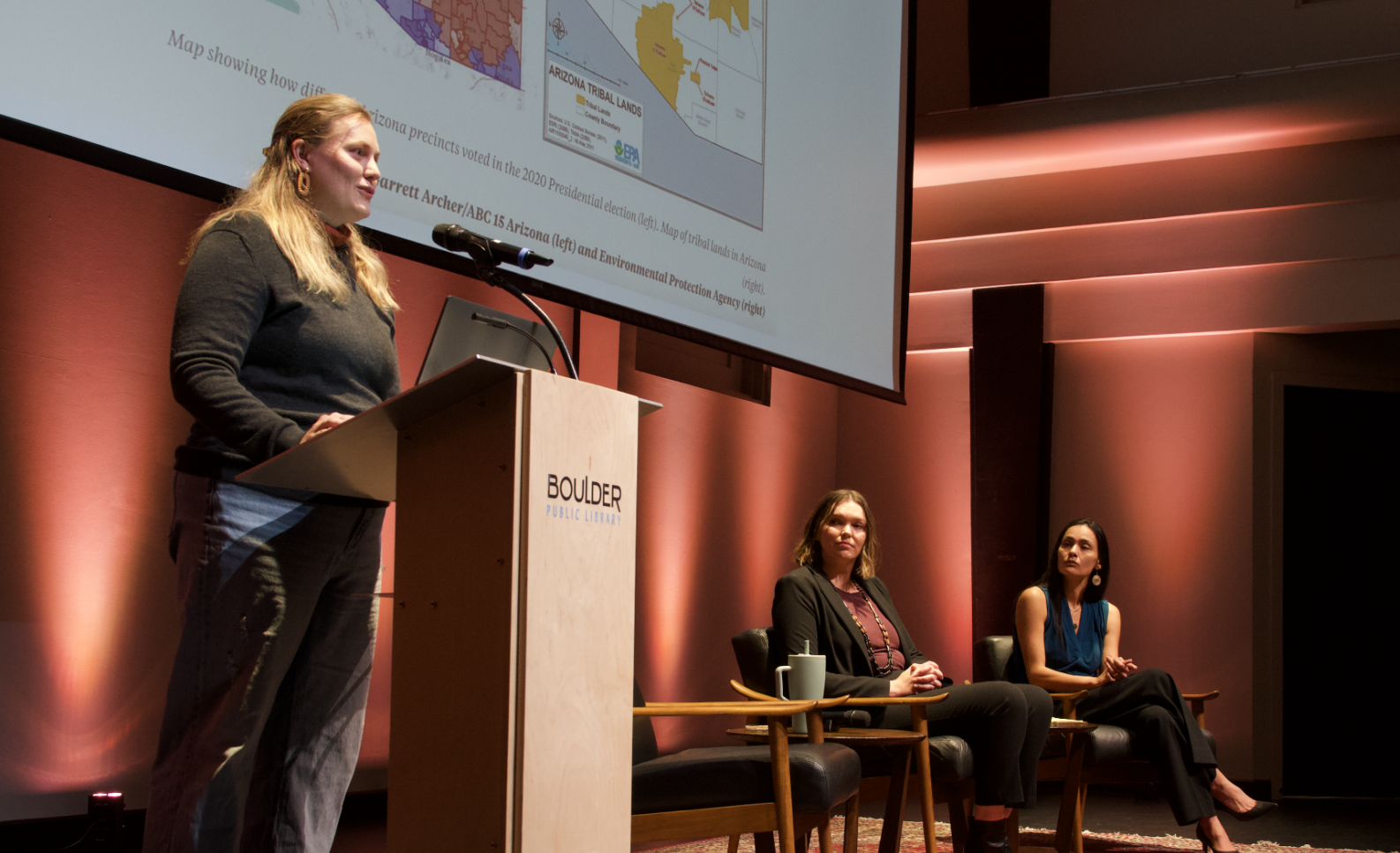By Sarah Taylor and Melodie Miller

Left to right Christina Stanton, Hannah Ahder, Allison Neswood. “The Power of the Indigenous Vote” panel was held in the Canyon Theater at Boulder Public Library, discussing voting barriers special to Indigenous voters and calls to action for non-Indigenous allies voting this election.
Photo by Melodie Miller
November marks the intersection of the start of Native American Heritage Month and the end of the 2024 election season. Along with millions of other American citizens, Indigenous voters will cast their ballots on Tuesday, Nov. 5.
Historically, Indigenous citizens have been underrepresented at the polls. According to the Native American Rights Fund, Indigenous voter turnout was less than 50% in general elections from 2012 to 2022.
Despite the low turnout, the Indigenous vote has made a substantial impact in previous elections. NARF reported that the cumulative votes from the Navajo Nation, roughly 67,000, played a significant role in Arizona voting blue in the 2020 general election.
“Imagine if all [Indigenous people] could vote without barriers and without feeling disempowered at the polls,” said CU Boulder director of American Indian Law Clinic, Christina Stanton.
Stanton was one of three advocates for Indigenous voting rights who paneled at the “The Power of the Indigenous Vote” event at the Boulder Public Library on Friday, Nov. 1.
Geographically, Indigenous reservations tend to be isolated with unreliable infrastructure and transportation, limiting citizens’ access to voting polls. Some reservation community members must travel by plane to the nearest poll on election day.
CU Boulder law student and Coquille Nation citizen Hannah Ahders recalled a time when her clinic team traveled to North Dakota for a voting advocacy visit and were trapped in an ice storm on the way home.
“I think that was traumatizing enough for them just for one day,” said Ahders. “I can’t imagine what it would be like to live on a reservation and face these barriers more often.”
Reservations are considered nontraditional descriptive addresses without a number or street name. Though some states accept reservation addresses, voting by mail is not reliable.
“Postal service was established as a mechanism for settlers and federal agents to communicate with each other,” Ahders said. “It was designed to serve colonizers, not Native people.”
Another voting barrier is inadequate language assistance. Under Section 203 of the Voting Rights Act of 1965, La Plata and Montezuma counties in Colorado require language assistance for Ute speakers on the Ute Mountain Ute Reservation. However, tribal interpreters at the polls do not ensure confident ballot comprehension for Indigenous voters.
NARF attorney and Navajo Nation citizen Allison Neswood focuses on enforcing Section 203 for all minority language speakers, including those who speak unwritten oral Indigenous languages.
“States must provide written guides to [Indigenous] community outreach, CDs of the ballots and recorded translations of those ballots,” Neswood said.
These barriers have complex histories in every state and will not be solved through the 2024 election alone, creating an additional layer of importance when electing officials who will be serving the future.
“Everyone has someone running for office in their area. In this election and future elections, ask them what their plan is to advance tribal sovereignty,” Neswood said. “Ask them what tribes are in their jurisdiction and if they have gone to their reservations and talked to their people.”
Putting Indigenous voices at the forefront
Weeks before election day, President Joe Biden acknowledged the generational trauma imposed by Indigenous boarding schools across the country and formally apologized. Biden then promised to strengthen ties between the government and Indigenous tribes in the future.
The Harris-Walz campaign has pushed for stronger relationships with Indigenous communities by visiting reservations and targeting advertisements to mobilize Indigenous voters. At a speech in October at the Navajo Nation in Arizona, Gov. Tim Walz said that Vice President Kamala Harris would respect tribes’ rights to self-govern more than her opponent former President Donald Trump, but did not specify future policies.
Acknowledging Indigenous voters’ concerns is a small start to empower political engagement.
Vice President of the CU Boulder American Indian Engineering and Science Society Kaylan Madrid, who has Ysleta Del Sur Pueblo heritage, is concerned about the future of international affairs in the Gaza Strip. Comparisons can be drawn between Indigenous Palestinians, who have similarly been displaced and colonized, and the Indigenous experience in the U.S.
“I think it’s very important to find Indigenous solidarity where you can,” Madrid said. “For me, the biggest thing right now is the genocide in Gaza.”
Noelle Bagola, CU Boulder student and member of the Navajo and Cheyenne River Sioux Nations, shared how this election could impact her and her communities.
“As a young woman, I am concerned about what bodily autonomy I will have in the future,” Bagola said.
If Colorado’s Amendment 79 passes, it will protect abortion rights under the state constitution.
“I’m not on the reservation, but my family would be affected by oil companies impacting their water resources. They don’t have an address, so they won’t be able to voice their concerns to a representative,” she continued, referring to fossil fuel pipelines deteriorating Navajo land.
Bagola would also like to see more state and presidential candidates acknowledge tribal sovereignty to protect Indigenous land from government environmental intervention.
Following centuries of cultural destruction, candidates and other U.S. citizens must listen to Indigenous voices as the first step in restoring trust with Indigenous Nations. Exercising voting rights is the most accessible way for citizens to make national change when aiming to improve the rights of Indigenous communities.
“History is not your fault, but it is your responsibility,” Stanton said.

